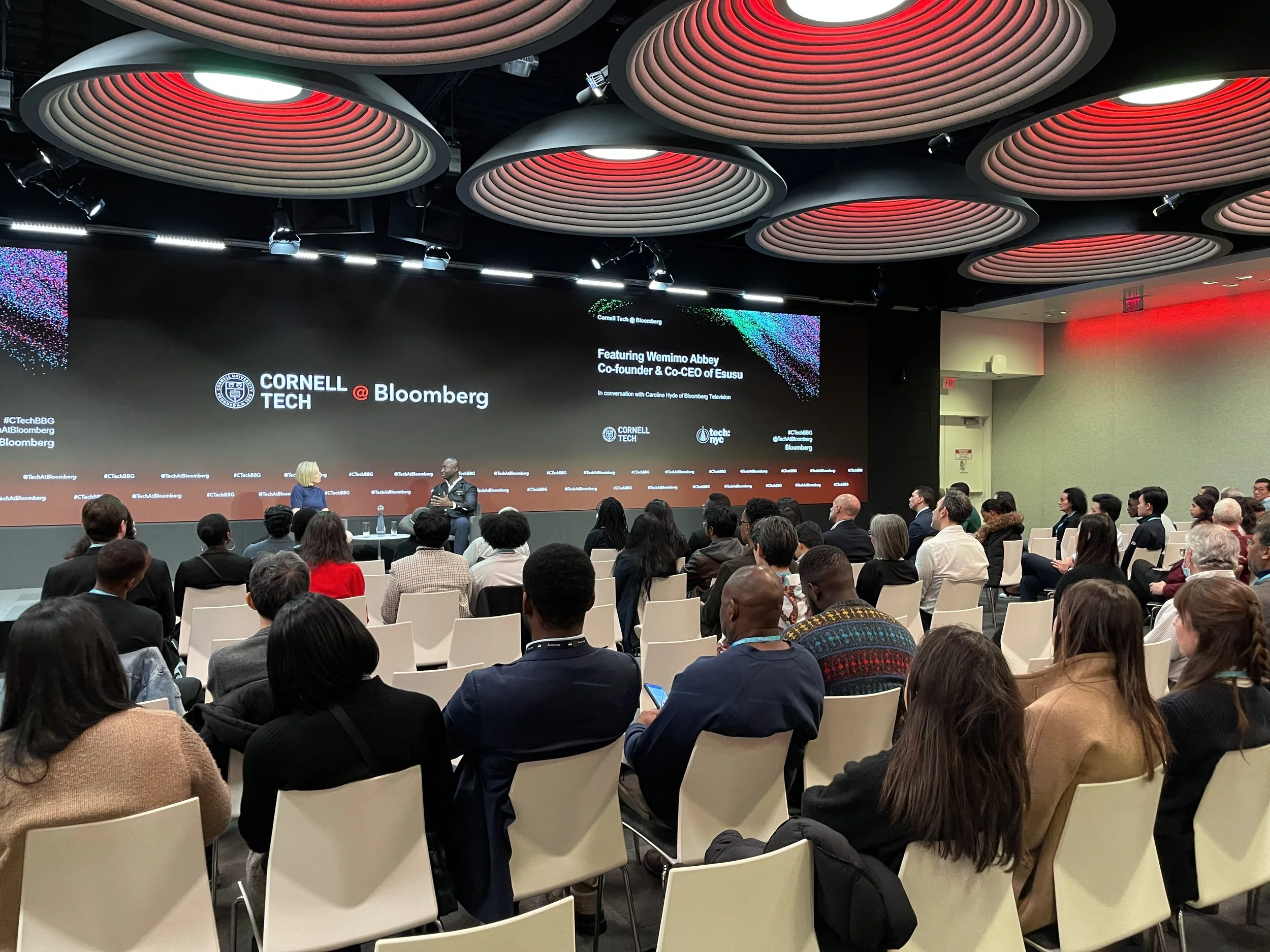How Esusu’s Wemimo Abbey is using credit reporting to bridge the racial wealth gap
Wemimo Abbey has personally experienced the frustration of being stuck without a credit profile in the United States: When his family came to America from Nigeria when he was 17, the future co-founder & co-CEO of the financial technology platform Esusu watched his mother struggle to secure a loan due to her lack of a credit history. After earning degrees in business management and public administration, Abbey decided to found a company that could help others escape the same fate.
“Without a credit score, the ‘American Dream’ isn’t attainable,” he says.
Fast forward to January of 2022, when Esusu raised $130 million in a Series B round led by SoftBank’s Vision Fund 2, making it one of a small number of Black-owned unicorn companies in the United States, just four years after its founding. Today, the startup reaches more than 3.5 million rental units across all 50 states.
The company, which reports on-time rent payments to the three national credit bureaus (Equifax, Experian, and TransUnion), provides an avenue through which middle- and low-income Americans can generate opportunity and build financial health. Since the beginning of the COVID-19 pandemic, Esusu has also offered Esusu Rent Relief – an interest-free, penalty-free loan – providing stability to both renters and landlords during times of distress.
“You can always create win-win outcomes,” says Abbey, referring to a principle he calls “justice capitalism.” He believes this idea is the key to bridging the racial wealth gap. For Abbey, Esusu provides a way for people of color to access opportunities — good credit, a mortgage, a leg up — that they’ve historically been denied.
Abbey joined Caroline Hyde, co-host of “Bloomberg Technology” on Bloomberg Television, at Bloomberg’s Global Headquarters in New York City on Thursday, February 23, 2023 for a conversation as part of the Cornell Tech @ Bloomberg Speaker Series. He shared thoughts on how his identity as an immigrant influenced his company’s strategy and how data can shrink the racial wealth gap.
Watch the full discussion:
Finding the long way to the ‘American Dream’
“I grew up in the slums of Lagos, Nigeria,” Abbey says. He and his two sisters were raised by their mother; Abbey lost his father at the age of two. “One thing my mother fundamentally believed in was the importance of education,” he says, despite her not having secured even a high school degree.
In 2009, when the family moved from Nigeria to Minneapolis, they discovered how difficult it was to settle and thrive in the United States without a credit history. In order to afford the move — and to send Abbey to college — his mother approached local banks to secure a loan. However, without a credit history, the family was turned away, and eventually they were forced to accept a loan with an interest rate of over 400 percent.
This is a conundrum faced by approximately 1 in 10 adults in the United States. To afford the gargantuan interest rate, Abbey says his mother worked at a post office for over two decades, while spending 60 percent of her salary on her kids’ education.
Esusu, which was founded to address this very problem, is actually Abbey’s “third rodeo as an entrepreneur,” he notes. He started with a clean water business when he was 17, having nearly died of typhoid in Nigeria. That company, Clean Water for Everyone, provided affordable water infrastructure to over a quarter of a million people across the globe.
A few years later, while at New York University, he worked alongside Beth Noveck, an open government advocate who also served in the Obama Administration, to map international development finance across Africa. That company was acquired in 2015, but the work of capturing usable data from a variety of sources was foundational to Esusu’s origin: “How do you capture clean, reliable, transformative rental data and pipe it to the consumers and agencies?” This question would lead directly to Esusu, which Abbey co-founded alongside Samir Goel in 2018, after years of laying the groundwork for the concept.
Bridging the racial wealth gap with data
“How can we make sure you’re not seen as guilty until proven innocent?” asks Abbey. “Because that’s what a credit score does.”
There are more than 110 million Americans who rent. Most of them are middle- and low-income people, but those rental payments aren’t factored into their credit scores. That mortgage payments do count towards that “three-digit financial identity card,” says Abbey, further compounds this divide and makes it harder for renters to maintain their financial health. But with Esusu, Abbey found the opportunity to capture and report rental data going back 24 months, helping renters build their credit.
Getting involved in credit histories required Esusu to work with an array of financial institutions, some of which had less-than-desirable histories when it came to discrimination and redlining, “systemic policies” that Abbey noted have left behind Black people and other people of color in this country. But he and his co-founder weren’t interested in rhetoric, he says. Instead, they were interested in how best to engage institutions and work towards more equitable futures.
“Our idea was: How do we work with the government, with the Federal Housing Finance Agency? How do we work with Freddie Mac and Fannie Mae and say: ‘You have a duty to serve, you have a duty to provide access to housing?’” Abbey says. “So we collaborated with them, and we’re able to give folks that opportunity to establish a credit score.”
It took nearly three years to build relationships with the big banks and consumer agencies, but Esusu’s founders persevered: “My mother always said, if you hang around the barbershop, sooner or later you’re going to get a haircut,” says Abbey. “So we stuck in there.”
A win-win solution
There are 45 million people in this country that don’t have a credit score, says Abbey, and the average debt in America is $92,000. At the same time, inflation is at its highest level since the 1970s, and the average American’s savings are dwindling. New York City, Abbey says, has reported some of the worst rent collection rates in its history. So, while it may seem counterintuitive in a moment when companies are concerned about their access to capital, Abbey argues that companies like Esusu have the potential to create a ripple effect throughout the economy, and to help level the playing field for communities that have historically faced barriers to financial wellbeing.
In addition to enabling renters to report on-time rent payments on their credit histories, residents in Esusu-enabled properties have access to apply for Esusu Rent Relief – an interest-free, penalty-free loan – to help keep a roof over their head while navigating financial hardship. Those loans, he says, can affect a broad population: They’re good for the landlord, good for the renter, and good for society at large. And if you free up some of the capital that represents the average consumer’s skyrocketing debt, he says, “you can unlock close to $4 trillion,” which is as good for policymakers as it is for the United States’ GDP.
But for Abbey, it’s not just about his company’s ultimate success, or building a unicorn: “I care about the family in Iowa that can’t keep a roof over their heads because things have gotten incredibly expensive,” he says. “I care about the family in St. Louis, Missouri, that’s trying to figure out how they’ll send their kids to school.”
“I have always lived my life with this idea that businesses can actually have a profound impact in society,” he says.
This article was originally published by Tech at Bloomberg.












